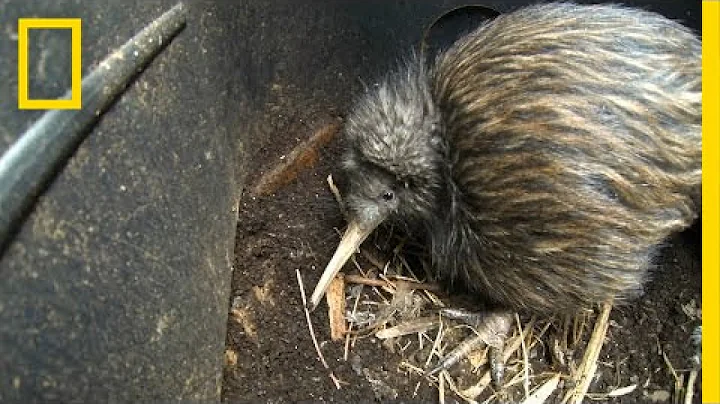
Many scientists jokingly call the kiwi the "honorary mammal" for a certain reason. First of all, its wings have completely degenerated, and its feathers have completely evolved into filaments similar to the fur of mammals. More importantly, Generally speaking, birds have very strong visual abilities, but the kiwi's vision is very weak. It mainly relies on its sense of smell to find food. Even though it is a bird, it wants to live like a mammal.

What’s even more peculiar is that the eggs of kiwis are relatively huge. Generally, the weight of kiwis is about 2 kilograms, but the eggs laid by female kiwis weigh 0.5 kilograms! It is roughly equivalent to a 120-pound human mother giving birth to a 30-pound baby...
The reason why their eggs are huge may also be related to their desire to live as mammals. Think calves will run when they are born, but most birds cannot stand firmly when they are first hatched, but the kiwi is a different species of bird. Due to the large number of birds on the New Zealand Islands, small kiwis must run as soon as they hatch to avoid being hunted by birds. In order to do this, their eggs must be large enough and contain enough nutrients to ensure that the newly hatched Baby kiwis are large enough to run and have enough energy to keep them alive for two weeks.

In a new study recently published in Current Biology, scientists from the University of Toronto Scarborough found that when two massive volcanic eruptions shrouded New Zealand in ash, They changed the kiwi's genes forever. There are four distinct lineages of kiwis that live in different parts of New Zealand's North Island. Scientists don't yet know why these four birds exist, but they are known to have survived two massive volcanic eruptions.
Researchers have found that volcanic eruptions destroyed most birds and isolated survivors, leaving little genetic inheritance. The researchers say that by analyzing the kiwi's DNA, you can easily tell which group the bird comes from, and considering that they are the same species, they are very different from each other. "Our findings can prove that these volcanoes did have an impact on the kiwi, and this impact continues to this day." These impacts are more or less related to the incredible characteristics of the kiwi mentioned above.

About 30,000 years ago, the Taupo supervolcano erupted in a large-scale eruption, covering a large area of the island in thick layers of volcanic ash and igneous rock, erupting a total volume of more than 1,000 cubic kilometers of volcanic ash and particles. About 2,000 years ago, the volcano erupted again. Although it was only one-tenth the size of the previous one, volcanic ash still covered the entire landscape.
The new study analyzed the genetics and location of 57 kiwi birds collected by scientists in New Zealand between the 1980s and 2000s. The researchers used a supercomputer to create a two-dimensional map of the island, then placed the kiwis and their genetic data at their current locations.

Computer simulations of the eruption were performed and compared among 12 possible models of how birds were affected. The researchers then determined which outcome brought the particular lineage of kiwis closest to those found today with similar genetic characteristics.
simulation results show that the first volcanic eruption wiped out most birds, but a few birds survived on the edge of the island. The surviving groups likely remained isolated from each other, as they were separated by natural barriers such as rivers and mountains, but they eventually came together thousands of years later. On a smaller scale, the second eruption had similar effects: death, further isolation, and a stronger genetic signature.

The results also suggest that the kiwis later moved slowly toward the center of the island, and over several generations of breeding, they passed on the specific genetic traits found today.While early humans destroyed much of the kiwi's habitat and made it a threatened species, its impact doesn't fully explain the birds' genetic differences. The island's indigenous Maori people have lived on the island for about 700 years, while Europeans only began large-scale immigration about 160 years ago. It is difficult for genetic differences to appear in such a short period of time.

Many people do not believe in the theory of evolution , probably because they think evolution is an easy process, just like the characters in movies or cartoons, who "duang" evolve stronger and more combat-effective. But in fact, the ancestors of most living things in the world have experienced many disasters, experienced populations on the verge of extinction, and gone through a long process of recovery and population integration before they finally became what they are today. As we call it the "weird" kiwi.






















